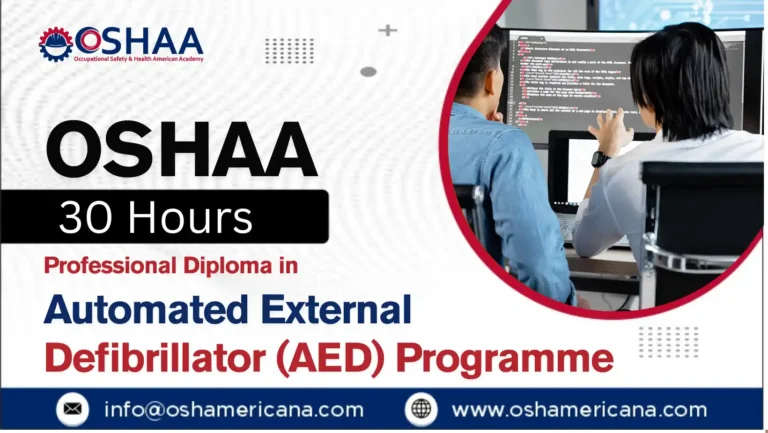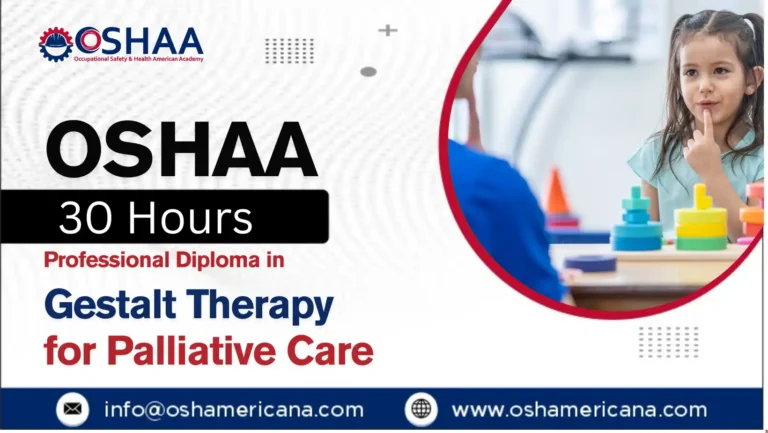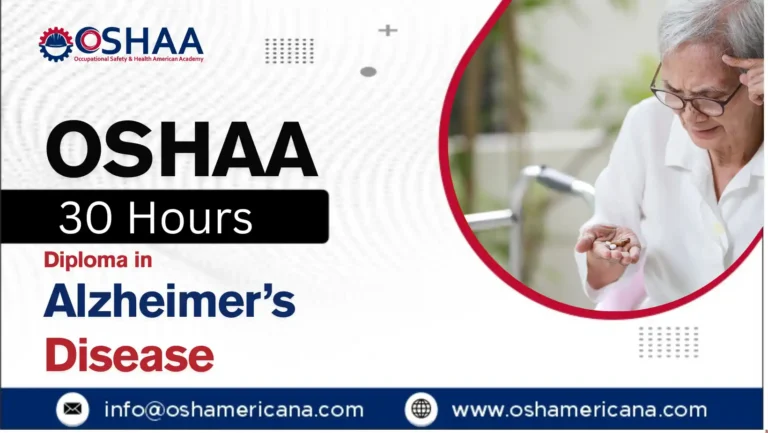Abuse awareness and response training is essential for individuals working in social care, healthcare, education, and community services. The OSHAA 30-Hours Diploma in Abuse Awareness and Response Training provides comprehensive knowledge on recognizing, preventing, and responding to different forms of abuse. This program is designed to equip professionals with the skills to protect vulnerable individuals, ensure compliance with safeguarding laws, and promote a safe environment across various sectors.
This diploma covers essential topics related to abuse awareness, intervention strategies, and legal obligations for safeguarding vulnerable groups. Participants will develop a strong understanding of abuse types, warning signs, reporting procedures, and best practices for handling cases professionally and ethically.
The OSHAA 30-Hours Diploma in Abuse Awareness and Response Training is a crucial qualification for professionals dedicated to safeguarding and protecting vulnerable individuals. With a focus on legal compliance, ethical responsibility, and practical intervention skills, this course empowers participants to create safer environments in both professional and community settings. By completing this training, individuals will gain the necessary knowledge and confidence to respond effectively to abuse cases while promoting a culture of safety and protection.
OSHAA 30-Hours Diploma in Abuse Awareness and Response Training
Study Units
Learning Outcomes
Introduction to Abuse Awareness and Safeguarding (3 Hours)
- Understand the fundamental concepts of abuse and safeguarding
- Recognise the importance of safeguarding in professional and community settings
- Identify key roles and responsibilities in abuse prevention
- Develop awareness of safeguarding policies and legal frameworks
Types of Abuse and Recognising Warning Signs (4 Hours)
- Identify different types of abuse, including physical, emotional, sexual, financial, and neglect
- Recognise the warning signs and risk factors associated with abuse
- Understand how abuse affects individuals across different age groups and settings
- Learn early intervention strategies to prevent further harm
Legal and Ethical Responsibilities in Abuse Prevention (4 Hours)
- Understand key legislation related to abuse prevention and safeguarding
- Recognise the ethical responsibilities of professionals in protecting vulnerable individuals
- Identify legal reporting obligations and consequences of non-compliance
- Develop knowledge of human rights and confidentiality principles
Safeguarding Policies and Reporting Procedures (3 Hours)
- Learn about safeguarding policies and their implementation in different organisations
- Understand the correct procedures for reporting suspected or confirmed abuse cases
- Recognise the role of safeguarding officers and agencies in abuse response
- Develop skills to document and escalate abuse concerns effectively
Communication Skills for Supporting Victims of Abuse (4 Hours)
- Develop active listening and empathetic communication techniques
- Learn how to provide emotional support to individuals affected by abuse
- Understand appropriate questioning techniques when dealing with sensitive disclosures
- Recognise barriers to communication and strategies to overcome them
Psychological Impact of Abuse and Trauma-Informed Care (3 Hours)
- Understand the short-term and long-term psychological effects of abuse
- Learn trauma-informed approaches to support survivors of abuse
- Recognise common behavioural responses to trauma and abuse
- Develop strategies to create a supportive and healing environment
Prevention Strategies and Creating Safer Environments (3 Hours)
- Identify proactive measures to prevent abuse in professional and community settings
- Learn how to implement safeguarding protocols in workplaces and institutions
- Understand the role of education and awareness in abuse prevention
- Develop risk assessment skills to enhance safety and security
Multi-Agency Collaboration in Safeguarding (3 Hours)
- Understand the role of different agencies in safeguarding and abuse prevention
- Learn the importance of inter-agency cooperation and information sharing
- Recognise how law enforcement, social services, and healthcare work together in abuse cases
- Develop skills to engage with external agencies effectively
Handling Disclosure and Confidentiality Considerations (3 Hours)
- Understand the correct procedures for handling abuse disclosures
- Learn best practices for maintaining confidentiality while ensuring victim safety
- Recognise legal obligations related to data protection and record-keeping
- Develop skills to manage disclosures with sensitivity and professionalism
Case Studies and Practical Scenarios in Abuse Response (3 Hours)
- Analyse real-world abuse cases to understand challenges in safeguarding
- Develop problem-solving skills to respond effectively to abuse situations
- Practise decision-making in simulated abuse response scenarios
- Apply learned safeguarding principles to case study evaluations
Comprehensive Understanding of Abuse and Safeguarding
Provides in-depth knowledge of different forms of abuse, risk factors, and safeguarding measures to protect vulnerable individuals.
Enhanced Legal and Ethical Awareness
Equips participants with a strong understanding of legal responsibilities, ethical considerations, and reporting obligations in abuse prevention.
Improved Ability to Recognise and Respond to Abuse
Develops skills to identify warning signs, handle disclosures sensitively, and implement appropriate intervention strategies.
Stronger Communication and Support Skills
Enhances interpersonal and communication techniques for supporting victims of abuse with empathy and professionalism.
Increased Confidence in Abuse Prevention Strategies
Provides practical tools for assessing risks, implementing safeguarding policies, and creating safer environments.
Better Multi-Agency Collaboration
Develops an understanding of how to work effectively with social services, healthcare, law enforcement, and safeguarding agencies.
Career Advancement Opportunities
Enhances employability in social care, healthcare, education, law enforcement, and safeguarding roles.
Contribution to Safer Communities
Empowers professionals and organisations to take proactive steps in preventing abuse and ensuring a culture of safety and protection.
Hands-On Learning Through Case Studies
Applies theoretical knowledge to real-world scenarios, helping participants gain practical experience in abuse response.
Internationally Recognized Qualification
Provides a valuable credential for professionals seeking to enhance their safeguarding expertise and career prospects in various sectors.
Social Care Professionals
Ideal for social workers, support workers, and care assistants involved in safeguarding vulnerable individuals.
Healthcare Practitioners
Essential for doctors, nurses, therapists, and other medical professionals who may encounter abuse cases in their practice.
Teachers and Educational Staff
Beneficial for schoolteachers, administrators, and childcare providers responsible for child protection and welfare.
Law Enforcement and Legal Professionals
Relevant for police officers, legal advisors, and child protection officers handling abuse cases and investigations.
Mental Health and Counselling Professionals
Suitable for psychologists, counsellors, and therapists supporting survivors of abuse and trauma.
Community and Charity Workers
Essential for volunteers, youth workers, and non-profit organisations working in safeguarding and victim support.
HR and Workplace Compliance Officers
Valuable for human resource professionals responsible for workplace safeguarding policies and staff welfare.
Residential and Domiciliary Care Workers
Recommended for professionals caring for the elderly, disabled, or individuals in vulnerable situations.
Government and Policy-Making Officials
Useful for those involved in developing safeguarding policies, legislation, and regulatory frameworks.
Anyone Committed to Safeguarding and Abuse Prevention
Beneficial for individuals seeking to improve their awareness of abuse prevention and response in professional or community settings.







